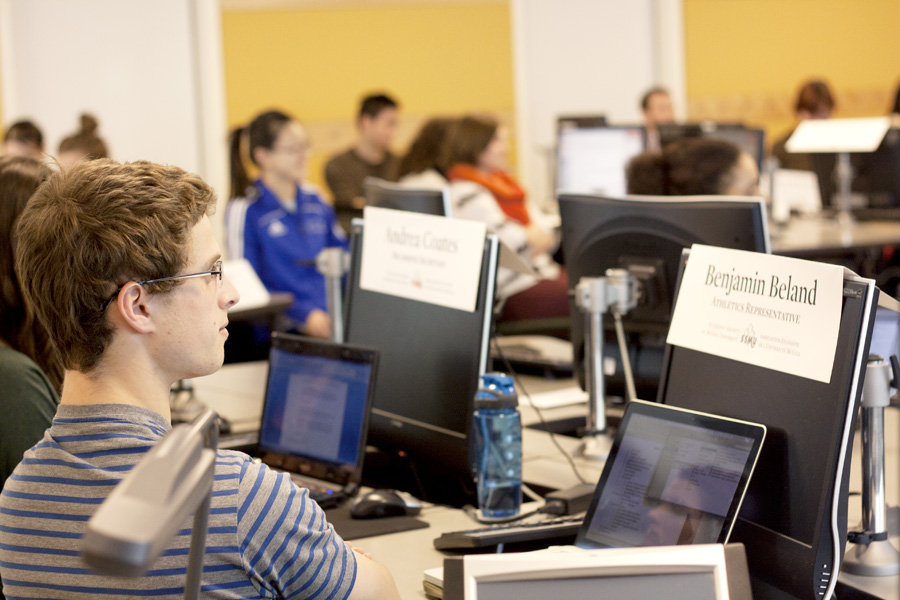Last Thursday, the Students’ Society of McGill University (SSMU) Council met in Burnside 511, one of two Active Learning Classrooms at McGill. Included in the topics of discussion was its relationship with the Quebec Student Roundtable (Table de concertation étudiante du Québec, or TaCEQ) and the possibility of creating another representative position on TaCEQ.
McGill currently has four representative seats on TaCEQ. SSMU Vice-President External Robin Reid-Fraser said Council would increase SSMU commitment to TaCEQ if they created another permanent position for representation.
“McGill has a lot of people who are from outside Quebec,” Reid-Fraser said. “My understanding is that a lot of people don’t even know we are a part of TaCEQ, or what it’s for. So it’s important for us to get word out there with things like newsletters or organizing events like panel discussions.”
Created in 2009, TaCEQ is a province-wide round-table for member student associations to lobby the government as a collective. SSMU is currently one of three members alongside student associations from Université Laval and Université de Sherbrooke. With these three associations, TaCEQ represents 65,000 students in Quebec.
“Ultimately, TaCEQ is intended to function as a formalized round-table, where member student associations can, with a louder voice, lobby the government with improved success,” the SSMU website reads. “The structure of TaCEQ is built to prevent it from turning into a large organization carried away with its own purpose and disconnected from its base.”
TaCEQ is mostly volunteer-based and operates with a small budget. It does not charge its own membership fees like other large student associations, according to Reid-Fraser. Instead, TaCEQ approves its finances at the beginning of the financial year and its expenses at monthly meetings.
“Currently we use this structures because TaCEQ is small and fairly new compared to the other associations,” Reid-Fraser said. “If we get more member associations and are able to work with a larger budget, then the structure may changesomewhat.”
Some councillors raised concerns about electing a new representative to TaCEQ, and suggested that SSMU does not take full advantage of its current level of representation, since many of McGill’s seats are empty during meetings. They also discussed to whom the new TaCEQ representative would be responsible, and under which student organizations on campus the representative would serve.
“I would really want to integrate [SSMU Council] and the TaCEQ representatives,” Reid-Fraser said. “Once we get a better picture of what we need [at the] next [TaCEQ] meeting, I’ll be able to bring the feedback and issues back to Council and go forward from there. Hopefully we can find agreement by then [about] what we’re looking for.”
SSMU Council is usually held in the Lev Bukhman Room in the Shatner Building. Thursday’s meeting was SSMU’s second “roaming Council” of the year, which is why it was held in Burnside 511.
“The purpose of ‘roaming Council’ is to expose the council to different parts of campus, and I think the active learning classroom is an exciting project that could be great for students,” SSMU President Josh Redel said.
As part of the Student-Centered Active Learning Environment with Upside-Down Pedagogies project, Active Learning Classroms (ALCs) were designed in 2009 to facilitate learning and teaching experiences. Since then, the Teaching and Learning Spaces Working Group at McGill has overseen ALCs at McGill to help enrich education experiences.
“You’re not in rows, you’re not facing the same direction, and you can roll around on your chairs,” Oksana Maibroda, McGill’s Educational Technology Consultant, said. “What this room allows for lecture, is that if the teacher wants to work on certain subject, he or she has a lot of ways to communicate to the students.”
Burnside 511 features multiple large overhead projection screens, as well as chairs and desks which allow students to face one another, rather than a professor’s podium. Much like a computer lab, the rotating chairs are easily adjustable and designed to facilitate students break ing into discussion groups.
“This is one of the many cool things that McGill’s been working on,” Redel said. “At McGill, the problem is how to make classrooms smaller and more interactive. It’s cool that people on the administration and staff members are working on this.”









